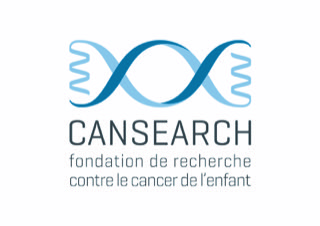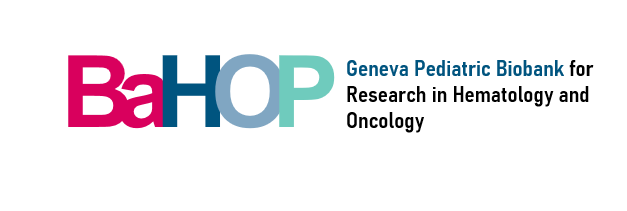2. Biobank infrastructure (BaHOP, BISKIDS & BIOLINK)
The increasing importance of biobanks for research is undeniable. Registers linked to biobanks play a significant role in the development of cancer research by generating a high-quality resource with clinical annotation of relevant biological samples. In addition to this, there is a growing demand for biobanks to provide high-quality samples and go beyond precise knowledge of sample locations. To address the lack of proven high-quality samples for the study of onco-hematological diseases, the Pediatric Oncology and Hematology Unit (POHU) of the University Hospitals of Geneva (HUG) founded the Geneva Pediatric Bank for Research in Oncology and Hematology (BaHOP) in 2016. BaHOP was established to promote research to improve prevention, diagnosis, and therapy in the fields of oncology, hematology, and immunology of pediatric diseases.
Method:
BaHOP consists of: 1) the international division, dedicated to collecting and storing samples and associated clinical data from patients enrolled in sub-studies related to pharmacogenomics; 2) the local division, which collects clinical data and biological material from patients treated in the onco-hematology unit at HUG; 3) the national division with BISKIDS (Germline DNA Biobank Switzerland for Childhood Cancer and Blood Disorders), established in 2018, to enable the collection of germline DNA from all Swiss children who have survived cancer and link these biological samples to their respective clinical data managed by the Child Cancer Research Group (CCR) of the Institute of Social and Preventive Medicine (ISPM) at the University of Bern.
Results:
As part of BaHOP, we have collected to date more than 8783 aliquots of individual samples from over 2767 patients (including participants in the additional studies PGX of ALL SCTped FORUM and MyeChild01). Clinical data are centralized in our biobank information management system (BIMS) for patients treated at the POHU of HUG and for patients enrolled in sub-studies of international clinical trials. For patients included in the BISKIDS project, the collection of clinical data is centralized at the ISPM of the University of Bern. Additionally, we have built the first national IT platform to link these resources. By linking the data held by the ISPM to information about biobanks of BISKIDS participants, we reduce redundancies and improve data quality sustainably. Each resource will be managed independently on its own server. A minimal set of essential data will be exchanged through a central interface at the ISPM of the University of Bern. This Trust Center is managed by an independent organization, not involved in research, the Swiss Research Data Linkage (SwissRDL) at the ISPM. The coupling will be done under a unique BioLink ID based on codes generated by the partners.
An important step in 2020-2021 was taken with the obtaining of the VITA accreditation label from the Swiss Biobanking Platform (SBP), which certifies compliance with the legal framework applicable to research involving human subjects.
In 2023, BaHOP received the NORMA label issued by the SBP, which guarantees the quality of operational processes (collection, transportation, reception, processing, storage, distribution) and harmonization of practices at the Swiss level. Among the 13 Geneva biobanks, BaHOP can claim to be the 2nd biobank to obtain this designation out of the 4 accredited. At the national level, only 34 biobanks are certified out of 92. Obtaining SBP accreditation has allowed BaHOP to be listed and present on the SBP biobankSQAN directory. Additionally, thanks to the collaboration of SBP with the European consortium of biobanks “Biobanking and BioMolecular resources Research Infrastructure – European Research Infrastructure Consortium for Biobanking” (BBMRI-ERIC), BaHOP is currently listed on the international BBMRI directory. Biobank members also actively participated in various conferences last year through a poster or oral presentation. Currently, BaHOP supports four research projects (including the GECCOS study), three of them with local resources and one international project with resources collected by the BISKIDS collection.

